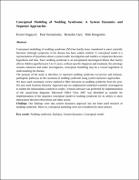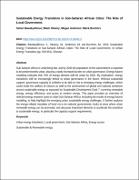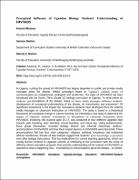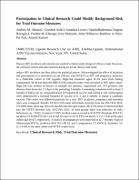Uganda Martyrs University Institutional Repository: Recent submissions
Now showing items 601-620 of 1009
-
Patenting Drugs From 1st January 2005: Implications and Problems
(Uganda Martyrs University, Department of Health Sciences, 2004-08)January the 1st 2005 is a very important deadline for the policy on patented drugs in developing countries: implementation of the agreement concerning paragraph 6 of the Doha Declaration is going to be put into practice, ... -
Antiretrovirals are Coming to Africa: Are you Ready?
(Uganda Martyrs University, Department of Health Sciences, 2004-04)International agencies are beginning a rapid scaling up of antiretroviral distribution programs in Africa. Some are particularly looking for "faith-based organizations" (FBOs) as partners. The new initiatives may offer ... -
Autonomy of Apex Hospitals in Uganda: Too Little, Too Slow
(Uganda Martyrs University, Department of Health Sciences, 2004-04)Hospital Autonomy, a sustained and purposeful change to improve the efficiency, equity and effectiveness of the health sector has been initiated to improve publicly-owned hospitals which, in many developing countries, ... -
Conceptual Modeling of Nodding Syndrome: A System Dynamics and Sequence Approaches
(2017)Conceptual modelling of nodding syndrome (NS) has hardly been considered in most scientific literature although symptoms of the disease has been widely studied. A conceptual model is a representation of hypothesis about a ... -
Voting with their Feet: What Lessons Can be Leant From Increased Consumption of Public Services in Uganda?
(Uganda Martyrs University, Department of Health Sciences, 2004-04)Uganda is a long way off achieving its Millennium Development Goals (MDGs). Persistently high child and maternal mortality reflect to some extent the poor performance of the health sector. The poor health service performance ... -
The Effort to Achieve the Millennium Development Goals in Uganda: Reaching for the Sky?
(Uganda Martyrs University, Department of Health Sciences, 2004-04)At the United Nations Millennium Summit in September 2000, world leaders placed development at the heart of the global agenda by adopting the Millennium Development Goals (MDGs). The Government of Uganda is a signatory to ... -
The Millennium Development Goals: The Ultimate Test of Will and Determination
(Uganda Martyrs University, Department of Health Sciences, 2004-04)On the eve of the 3rd millennium, stock was taken of PHC and health sector reforms. The results of a shocking failure of previously advocated goals were evident. Therefore, a new set of goals and mechanisms were adopted ... -
Sustainable Energy Transitions in Sub-Saharan African Cities: The Role of Local Government
(Elsiever, 2018)Sub-Saharan Africa is urbanizing fast, and by 2040 the population of the subcontinent is expected to be predominantly urban, placing a vastly increased burden on urban governance. Energy futures modeling indicates that 75% ... -
Political Economy of Health with Reference to Primary Health Care
(Uganda Martyrs University, Department of Health Sciences, 2004-04)Politics and economics have dealt with resource allocation from time immemorial. However, the basis for resource allocation and sharing depend on the nature and type of politics and economics, which also depend on different ... -
Primary Health Care and Sector-Wide Approaches
(Uganda Martyrs University, Department of Health Sciences, 2004-04)Primary Health Care and Sector-Wide Approaches to health development are among the major health sector reforms that have been undertaken in Uganda aimed at building a strong and cohesive health system. Inevitably, these ... -
Perceptual Influence of Ugandan Biology Students’ Understanding of HIV/AIDS
(2010)In Uganda, curbing the spread of HIV/AIDS has largely depended on public and private media messages about the disease. Media campaigns based on Uganda’s cultural norms of communication are metaphorical, analogical and ... -
Is DDT Safe? Considering Its Use For Malaria Control in Uganda
(Uganda Martyrs University, Department of Health Sciences, 2004-08)The insecticide DDT has been very successfully used for many years in malaria control programmes around the world. We assess the validity of the allegations that DDT is harmful to human health and the environment and find ... -
The Northern Uganda War: The “Small Conflict” That Became the World’s Worst Humanitarian Crisis
(Uganda Martyrs University, Department of Health Sciences, 2004-08)Acholi land was once known as the breadbasket of Uganda, but it is now the poorest part of the country. More than 900,000 people (over 80%) in the districts of Gulu, Kitgum and Pader are displaced, living in camps and ... -
Agricultural Biotechnology for Developing Countries
(Uganda Martyrs University, Department of Health Sciences, 2004-08)The Food and Agriculture Organization of the United Nations, in "The State of Food and Agriculture 2003-04", examines the potential of agricultural biotechnology to address the current and future needs of the world's poor ... -
Participation in Clinical Research Could Modify Background Risk for Trial Outcome Measures
(2014)Data on HIV incidence and retention are needed to inform study design of efficacy trials. However, the selection criteria and interventions during an actual clinical trial could reduce HIV incidence and thus affect the ... -
Delivering Health Care to IDPs: Experiences and Challenges in Katakwi District
(Uganda Martyrs University, Department of Health Sciences, 2004-08)There are two broad categories of IDPs in Katakwi district by cause; those displaced by the Karamojong rustlers and those displaced by the Lords Resistance Army (LRA) incursion. Sporadic Karamajong raids started over 50 ... -
Planning Health Care For Internally Displaced Persons: Experiences in Uganda
(Uganda Martyrs University, Department of Health Sciences, 2004-08)A significant proportion of Ugandans have at one time or another been forced to flee their homes. In 1997 alone, point prevalence revealed that 2,000,000 persons were displaced and it is estimated that currently about 1.6 ... -
Primary Health Care and Health Sector Reforms in Uganda
(Uganda Martyrs University, Department of Health Sciences, 2004-04)The health system in Uganda has undergone a number of changes since independence in 1962 and the PHC concept as a timely innovation, and very welcome in Uganda. And also as a response to the global economic decline of the ... -
Uganda’s Minimum Health Care Package: Rationing Within the Minimum?
(Uganda Martyrs University, Department of Health Sciences, 2004-04)Essential/minimum health care packages (MHCP) have appeared on the primary health care scene as a means of setting priorities for national health budgets. A technical approach of cost-effectiveness was sought to guide the ... -
The Bamako Initiative Was Not About Money
(Uganda Martyrs University, Department of Health Sciences, 2004-04)The Bamako Initiative (BI) was a pragmatic strategy to implement primary health care (PHC) in the era of economic structural adjustment. Championed by UNICEF’s charismatic leader, James Grant, it sought to fill the gap ...





















